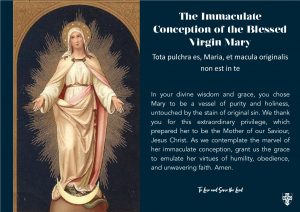The Immaculate Conception of the Blessed Virgin Mary is a profound and cherished dogma that underscores Mary’s unique and singular role in salvation history.
This teaching asserts that, by a special grace from God, Mary was conceived without the stain of original sin, preserving her purity and holiness. This immaculate state allowed her the honour to bear Jesus Christ, the Son of God, into the world.
The Catholic Church holds that this extraordinary privilege was granted to Mary due to her future role as the Mother of God. The doctrine, solemnly defined in 1854 by Pope Pius IX, reflects the deep veneration and honor accorded to Mary within Catholic theology, emphasizing her exceptional holiness and cooperation with divine grace in the plan of redemption.
The Feast of the Immaculate Conception is a joyous celebration in the Catholic liturgical calendar, marking Mary’s conception as a moment of grace and sanctity in the unfolding story of salvation.
Sing, Daughter Zion; shout aloud, israel! Be glad and rejoice with all your heart, Daughter Jerusalem! The LORD has taken away your punishment, he has turned back your enemy. The LORD, the King of Israel, is with you; never again will you fear any harm. – Zephaniah 3:14-16


